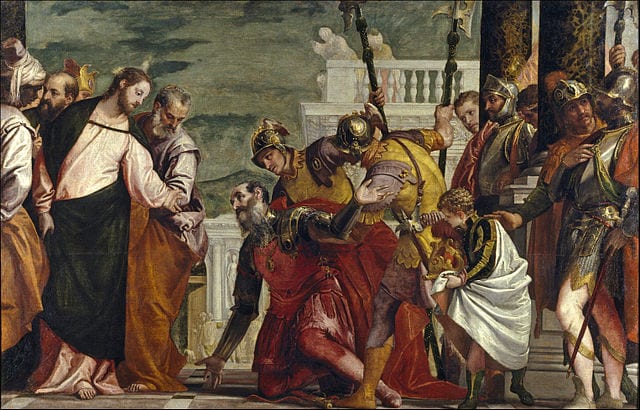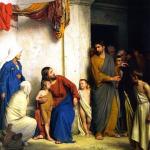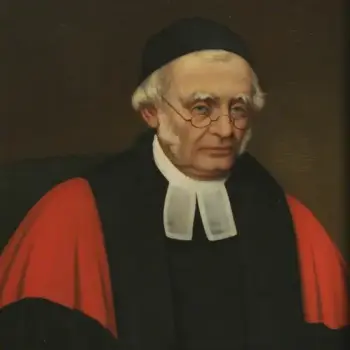
This is an installment of my replies to a series of articles on Mark by Dr. David Madison: an atheist who was a Methodist minister for nine years: with a Ph.D. in Biblical Studies from Boston University. His summary article is called, “Not-Your-Pastor’s Tour of Mark’s Gospel: The falsification of Christianity made easy” (Debunking Christianity, 7-17-19). His words will be in blue below.
Dr. Madison has utterly ignored my twelve refutations of his “dirty dozen” podcasts against Jesus, and I fully expect that stony silence to continue. If he wants to be repeatedly critiqued and make no response, that’s his choice (which would challenge Bob Seidensticker as the most intellectually cowardly atheist I know). I will continue on, whatever he decides to do (no skin off my back).
Dr. Madison believes we are not at all sure whether Jesus in fact said anything recorded in the Gospels. The atheist always has a convenient “out” (when refuted in argument about some biblical text) that Jesus never said it anyway and that the text in question was simply made up and added later by unscrupulous and “cultish” Christian propagandists.
I always refuse to play this silly and ultimately intellectually dishonest game, because there is no way to “win” with such a stacked, subjective deck. I start with the assumption (based on many historical evidences) that the manuscripts we have are quite sufficient for us to know what is in the Bible (believe it or not).
Dr. Madison himself — in his anti-Jesus project noted above, granted my outlook, strictly in terms of practical “x vs. y” debate purposes: “For the sake of argument, I’m willing to say, okay, Jesus was real and, yes, we have gospels that tell the story.” And in the combox: “So, we can go along with their insistence that he did exist. We’ll play on their field, i.e., the gospels.” Excellent! Otherwise, there would be no possible discussion at all.
*****
Dr. Madison called this installment: “Made-to-Order Stories for the Jesus Cult: But consistency was not a virtue” (9-28-18)
Every missionary who has ever lived has been inspired by the famous ‘Great Commission,’ spoken by the resurrected Jesus in Matthew 28:19-20: “Go therefore and make disciples of all nations, baptizing them in the name of the Father and of the Son and of the Holy Spirit, and teaching them to obey everything that I have commanded you.” Of course, we have a right to be skeptical that a dead man came back to life to give orders, but there are other reasons as well for suspecting that Jesus—even while he was alive—didn’t say this.
Since this gospel was probably written a good fifty years after the death of Jesus, Matthew probably wrote to motivate his readers at the time—and we know that he was an expert at making things up. . . . Moreover his portrayal of Jesus doesn’t hang together very well. In chapter 10:5-6, Jesus sends the disciples out on a preaching mission, with this caveat: “Go nowhere among the Gentiles, and enter no town of the Samaritans, but go rather to the lost sheep of the house of Israel.” In 15:24, when Jesus declines to help a Syrophoenician woman, he repeats this claim: “I was sent only to the lost sheep of the house of Israel.”
He did not “decline” help to this woman’s daughter, who was healed of demon possession (as even Dr. Madison notes in his critique, three paragraphs later):
Matthew 15:28 (RSV) Then Jesus answered her, “O woman, great is your faith! Be it done for you as you desire.” And her daughter was healed instantly.
So it’s absurd to claim that Jesus somehow didn’t want to heal her daughter. He did, and that shows His will. He was simply making a rhetorical point to draw her out. If He truly didn’t want to heal her, then obviously He wouldn’t have, no matter what she said. Or if this is what the — for Dr. Madison, deceitful, propagandistic — Gospel writer wished to convey, he wouldn’t have reported that Jesus did this (It wouldn’t have fit into the agenda, etc.).
Besides, being “sent” to the Israelites is a different proposition from “who Jesus decided to heal.” So this is a ridiculous and self-contradictory argument from Dr. Madison: surprisingly lousy even by his low “exegetical” [choke / cough] pseudo-standards. Truly this is an example of what Paul noted: “they became futile in their thinking and their senseless minds were darkened” (Rom 1:21).
Did he change his mind after the resurrection? Or had the compulsion to ‘make disciples of all nations’ come along by Matthew’s time, certainly under the impact of Paul’s zeal as well. This is a measure of the new cult’s hubris and delusions of grandeur. This never seems to dissipate; it is displayed by today’s fanatical sects, e.g. the Mormons and Jehovah’s Witnesses—“we gotta convert the world”…or at least rescue the remnant. . . .
In fact, the text in Matthew 15 is the author’s reworking of a story found in Mark 7, which is the focus of this article, . . .
This dumbfounded insinuation that Jesus somehow didn’t want to help or heal anyone but his own Hebrews / Jews, doesn’t hold water, either. As usual, Dr. Madison misses the forest for the trees, because he can’t trouble himself to see what Jesus actually said and did in this regard, elsewhere. There are many counter-examples that refute his silly theory:
1) Jesus’ interaction with the Samaritan woman at the well (Jn 4:5-29) illustrates His view. Here He not only ministered to her with great compassion, but noted at the end that salvation was to extend to the non-Jewish Gentiles as well: “salvation is from the Jews. But the hour is coming, and now is, when the true worshipers will worship the Father in spirit and truth, for such the Father seeks to worship him” (4:22b-23).
2) Matthew seems to not be aware of his own supposed “Jews only Jesus” since he applies an Old Testament passage about outreach to Gentiles directly to Jesus as the Servant and Messiah:
Matthew 12:15-21 Jesus, aware of this, withdrew from there. And many followed him, and he healed them all, [16] and ordered them not to make him known. [17] This was to fulfil what was spoken by the prophet Isaiah: [18] “Behold, my servant whom I have chosen, my beloved with whom my soul is well pleased. I will put my Spirit upon him, and he shall proclaim justice to the Gentiles. [19] He will not wrangle or cry aloud, nor will any one hear his voice in the streets; [20] he will not break a bruised reed or quench a smoldering wick, till he brings justice to victory; [21] and in his name will the Gentiles hope.”
3) Likewise, Luke records Simeon saying about Jesus:
Luke 2:30-32 for mine eyes have seen thy salvation [31] which thou hast prepared in the presence of all peoples, [32] a light for revelation to the Gentiles, and for glory to thy people Israel.”
4) Jesus told the Jewish “chief priests and scribes” (Mt 21:15) and “Pharisees” (21:45) that righteous Gentiles will enter the kingdom before self-righteous Jews (like them):
Matthew 21:31b-32 “Truly, I say to you, the tax collectors and the harlots go into the kingdom of God before you. [32] For John came to you in the way of righteousness, and you did not believe him, but the tax collectors and the harlots believed him; and even when you saw it, you did not afterward repent and believe him.
Matthew 21:42-43, 45 Jesus said to them, “Have you never read in the scriptures: `The very stone which the builders rejected has become the head of the corner; this was the Lord’s doing, and it is marvelous in our eyes’? [43] Therefore I tell you, the kingdom of God will be taken away from you and given to a nation producing the fruits of it.” [45] When the chief priests and the Pharisees heard his parables, they perceived that he was speaking about them.
5) Jesus healed the pagan Roman centurion’s servant, commended his faith, and noted that many Gentiles would be saved, and many Jews lost:
Matthew 8:5-13 As he entered Caper’na-um, a centurion came forward to him, beseeching him [6] and saying, “Lord, my servant is lying paralyzed at home, in terrible distress.” [7] And he said to him, “I will come and heal him.” [8] But the centurion answered him, “Lord, I am not worthy to have you come under my roof; but only say the word, and my servant will be healed. [9] For I am a man under authority, with soldiers under me; and I say to one, `Go,’ and he goes, and to another, `Come,’ and he comes, and to my slave, `Do this,’ and he does it.” [10] When Jesus heard him, he marveled, and said to those who followed him, “Truly, I say to you, not even in Israel have I found such faith. [11] I tell you, many will come from east and west and sit at table with Abraham, Isaac, and Jacob in the kingdom of heaven, [12] while the sons of the kingdom will be thrown into the outer darkness; there men will weep and gnash their teeth.” [13] And to the centurion Jesus said, “Go; be it done for you as you have believed.” And the servant was healed at that very moment.
6) Jesus’ famous parable of the Good Samaritan (Lk 10:29-37) had as its central message the notion that a non-Jew who helped someone is more of a “neighbor” than a fellow Jew who did nothing.
7) Here is Jesus healing another foreigner: a Samaritan man and commending his faith:
Luke 17:12-19 And as he entered a village, he was met by ten lepers, who stood at a distance [13] and lifted up their voices and said, “Jesus, Master, have mercy on us.” [14] When he saw them he said to them, “Go and show yourselves to the priests.” And as they went they were cleansed. [15] Then one of them, when he saw that he was healed, turned back, praising God with a loud voice; [16] and he fell on his face at Jesus’ feet, giving him thanks. Now he was a Samaritan. [17] Then said Jesus, “Were not ten cleansed? Where are the nine? [18] Was no one found to return and give praise to God except this foreigner?” [19] And he said to him, “Rise and go your way; your faith has made you well.”
8) Jesus specifically went to the land of the Gadarenes or Gerasenes, east of the Sea of Galilee, to minister to them (very odd behavior if Dr. Madison’s contentions are correct). This was where Jesus sent the demons into the pigs (one of Dr. Madison’s favorite Bible stories): Mk 5:1-20; Lk 8:26-39; Mt 8:28-34. Wikipedia, in its article on the region, states:
The name is derived from either a lakeside village, Gergesa, the next larger city, Gadara, or the best-known city in the region, Gerasa. . . . They were both Gentile cities filled with citizens who were culturally more Greek than Semitic; this would account for the pigs in the biblical account.
9) Jesus earlier echoed His message of the Great Commission (Mt 28:19-20):
Matthew 24:14 And this gospel of the kingdom will be preached throughout the whole world, as a testimony to all nations; and then the end will come. (cf. Mk 13:10; Lk 24:47)
Thus, Dr. Madison’s “argument” that Jesus wanted nothing to do with the Gentiles falls flat; it is the opposite of the truth. I’ve just proven that with nine biblical examples. And a tenth example that he gave to supposedly bolster his argument, didn’t even do so, when examined closely.
***
Photo credit: Jesus and the Centurion (c. 1571), by Paolo Veronese (1528-1588) [public domain / Wikimedia Commons]
***













